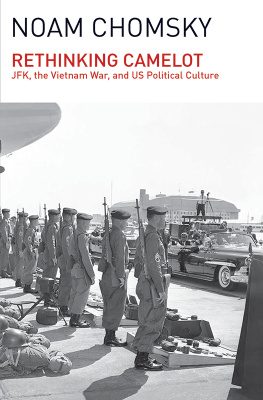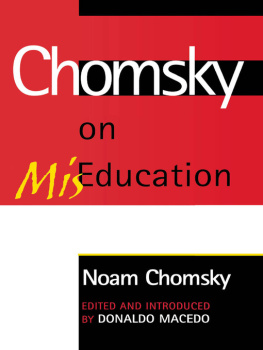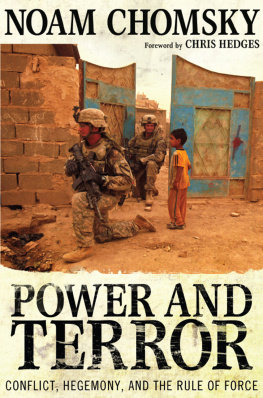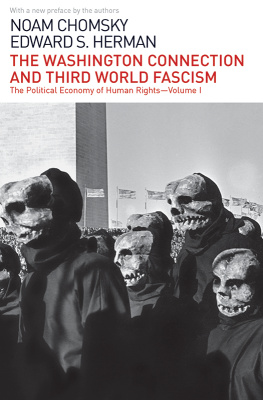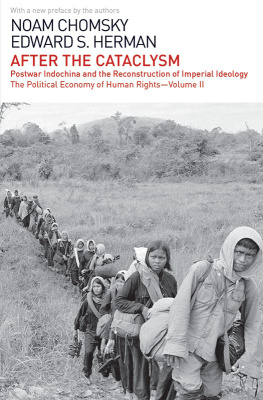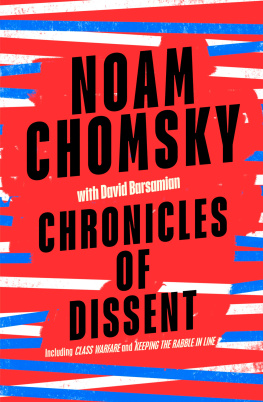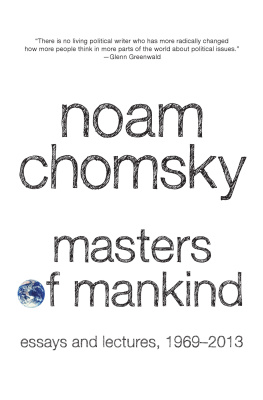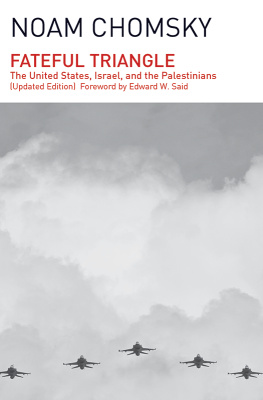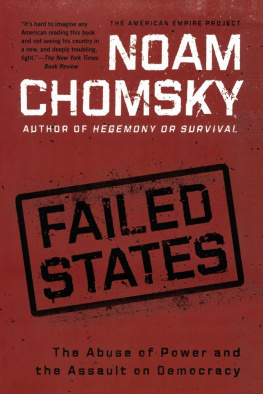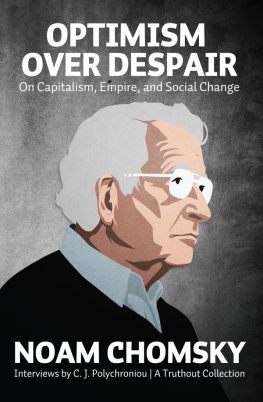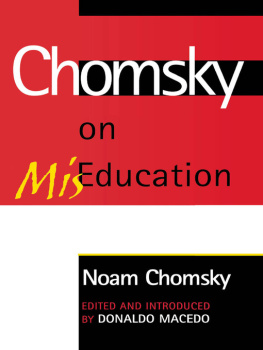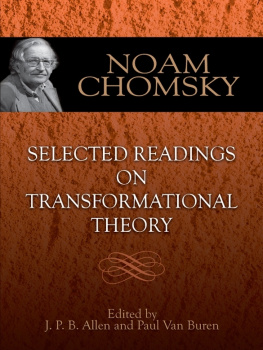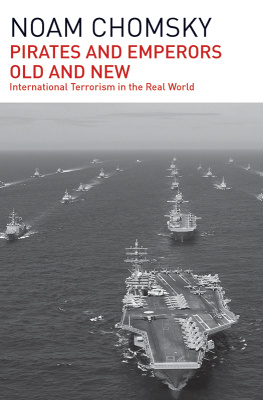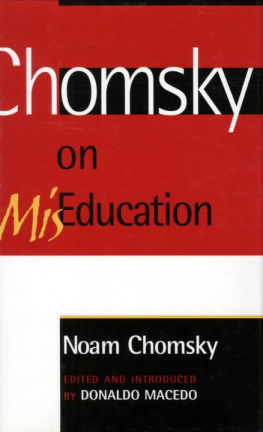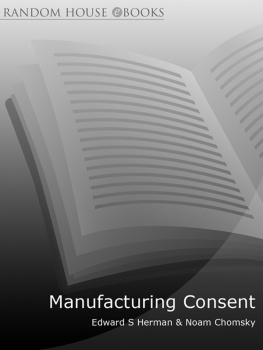Contents
Noam Chomsky 1993
Original edition published by South End Press, Cambridge, Massachusetts
This edition published in 2015 by
Haymarket Books
P.O. Box 180165
Chicago, IL 60618
773-583-7884
www.haymarketbooks.org
info@haymarketbooks.org
ISBN: 978-1-60846-403-6
Trade distribution:
In the US, Consortium Book Sales and Distribution, www.cbsd.com
All other countries, Publishers Group Worldwide, www.pgw.com
This book was published with the generous support of Lannan Foundation and Wallace Action Fund.
Cover design by Josh On. Cover image of President John F. Kennedy reviewing the First Air Commando Group at a demonstration at Eglin Air Force Base, Florida on May 4, 1962. The outfit has trained for guerilla warfare and some of its members returned from action in Vietnam. (AP Photo)
Library of Congress Cataloging-in-Publication data is available.
Preface to the 2015 Edition
The immediate occasion for rethinking Camelot was the release of a rich collection of declassified documents covering 196164, offering a good opportunity to reconsider what I had written twenty years earlier after the appearance of the two volumes of the Pentagon Papers , the Gravel edition released by Dan Ellsberg and Tony Russo and the government edition released in reaction. A great deal of other valuable material was also available at the time, and much more had appeared in the interim.
Camelot became a favored image of the liberal intellectuals entranced by the years of glory cut short cruelly by the assassination of JFK just at the time when he was about to go on to marvelous achievementsmurdered for that reason, according to many admirers. This book is concerned only with what actually happened, which accords poorly with the legend. It touches on the assassination only obliquely, taking no stand on the culprits except negatively: the evidence is overwhelming that it was not a high-level plot with significant policy consequences.
The main focus here is on Vietnam. A core part of the Camelot myth is that Kennedy was planning to end the war. The primary evidence presented consists of two classified documents, NSAM 263 (October 11, 1963) and 273 (shortly after the assassination). These are discussed in chapter 2. The former, in particular, continues to be subject to fanciful misreadings. It is actually quite clear and explicit, and even though the text was not available at the time, the press reported its contents accurately. The document expresses the Presidents reluctant acquiescence to proposals of his advisers that troops be withdrawn if they are no longer needed to ensure our fundamental objective of victoryPresident Kennedys insistent condition, as the record makes crystal clear, to the day of the assassination.
If Kennedy had had any interest in ending the war short of victory, he had a perfect opportunity in October 1963, when he accepted NSAM 263. As discussed in chapter 2, the United States then learned that the Saigon government it had installed was seeking a peace settlement with North Vietnam. Washington could have supported this effort, at least tolerated it, ending the war gracefully and taking credit for the peaceful outcome, even claiming in the usual manner that North Vietnam had capitulated, vindicating Washingtons noble intervention to defend South Vietnam from the assault from the inside (Kennedys term for the internal uprising that threatened to overthrow the client regime)internal aggression, in the interesting phrase favored by UN Ambassador Adlai Stevenson.
Instead of grasping this opportunity to withdraw with claims of victory, Kennedy moved at once to crush the threat of peaceful settlement and US withdrawal, backing the military coup that installed a regime of hawkish generals more attuned to Kennedys goals of military victory.
The newly released information established these conclusions more firmly, as discussed below. Documentary material that has been released since this book was written makes it even more clear that the tentative withdrawal initiative was primarily McNamaras, very likely influenced not only by the belief at the time that victory was in sight but also by budgetary considerations. In a careful scholarly review, Marc Selverstone concludes plausibly that McNamaras effort to devise a carefully calibrated, phased reduction of US troops from Vietnam seems to have been a function of federal and departmental planning as much as a response to the war itself.
Selverstone also gently refutes claims about Kennedys hidden intentionsso deeply hidden that there isnt a particle of evidence for them, though there is plenty of evidence refuting them. But Camelot wish-fulfillment is likely to be as resistant to fact and logic as the rather similar Reagan worship at the other extreme of the political spectrum.
The basic conclusions remain. By the late Eisenhower years, the vicious repression of the regime the United States imposed on South Vietnam in violation of the Geneva agreements of 1954 (which the United States rejected) had finally elicited indigenous resistance, which the regime was unable to contain. Kennedy therefore sharply escalated the US intervention to direct aggression, with extreme brutality: directing US air force attacks (under South Vietnamese markings), authorizing napalm and chemical warfare to destroy crops and livestock, initiating population removal to virtual concentration camps where the population was protected from the guerrillas that US intelligence and province advisers knew they were mostly supporting.
Reports from the US military were relatively optimistic, indicating that aggression might succeed, and would therefore be justified. At that point Kennedys advisers, primarily Defense Secretary Robert McNamara, called for phased withdrawal. Kennedy reluctantly acquiesced, while insisting, to the very end, that there could be no withdrawal without US victory in the war he launched. Easy opportunities for withdrawal were flatly rejected in favor of escalation, to the end. After the assassination, reports from the field finally began to reveal the truth: the US-run war was failing to overcome the assault from the inside. The same Kennedy advisers, including those later heralded as doves, therefore called for escalation of Kennedys war.
The war spread to North Vietnam, Laos, and Cambodia, with horrendous consequences, surely the worst state crime of the postWorld War II period. The crime is enhanced by the reaction. There is no need to tarry on Reagans lauding of a noble cause. Much more interesting are the reactions of presidents who can be taken seriously: President Carters judgment that we owe the Vietnamese no debt because the destruction was mutual, or the admonition to the Vietnamese by President Bush Ithe statesmanlike Bushthat we seek no vengeance for the crimes the Vietnamese have committed against us, and will agree to let them enter the global system that we dominate if they will recognize their duty to put all else aside and devote themselves to the one moral issue remaining from the war: finding the remains of American pilots whom they murdered while those pilots strayed innocently over North Vietnam. As Bush put it, with much media approbation, It was a bitter conflict, but Hanoi knows today that we seek only answers without the threat of retribution for the past. Their crimes against us can never be forgotten, but we can begin writing the last chapter of the Vietnam War if they dedicate themselves with sufficient zeal to the American pilots still missing.
Across the political spectrum, the Vietnam War is regarded as a US defeat. That too is an interesting reaction. True, the United States did not achieve its maximal aims: Vietnam was not turned into the Philippines. But as the record makes clear, the real concerns were quite different. They were one special case of a leading theme of Cold War history. When World War II ended, the United States was in a position of unprecedented wealth and power, and the political leadership developed sophisticated plans for a global system that would conform to the needs of dominant domestic forces within the business classes. Naturally, they were concerned that the system might erode, as happened at once, with what is called the loss of China as China declared independence. A loss, on the tacit and unquestioned assumption that it is ours by right, part of our world system. The loss of China quickly became a major factor in domestic US life, including the rise of McCarthyism: Who was responsible for the loss of China? Later presidents feared that they would be blamed for the loss of Indochina, and much else.
Next page
